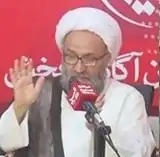Mohsen Heidari Alekasir
Ayatollah Mohsen Heidari AleKasir (Persian:محسن حیدری آل کثیر) is an Iranian Shia Islamic cleric who was born in 1957 in a middle class rural family in the village of Hor Riyahi Abadi[1] where is located near to Shush in Khuzestan province. He is one of Khuzestan current members in Assembly of Experts.[2]
Ayatollah Mohsen Heidari AleKasi | |
|---|---|
محسن حیدری آل کثیر | |
 Ayatollah Mohsen Heidari AleKasi | |
| Personal | |
| Born | 1957 (age 63–64) |
| Religion | Islam |
| Nationality | Iranian |
| Denomination | Shi'a |
| School | Twelver |
| Education | Ahwaz seminary and Qom Seminary |
Biography
Mohsen Heidari Alekasir started his education in Ahwaz seminary, and continued his education in Qom since 1980. He is also one of the current temporary Imams-Jom’ah (the Imams of Friday prayer) of Ahwaz as the capital of Khuzestan province.[3]
Compilations
Ayatollah Heidari AleKasir has the scholarly records of research and teaching at seminary and university. He has several compilations, among:
- Qaedeh la Zarar
- Hezb Alawi and Hezb Umavi
- Welayat al-Faqih Tarikhha wa Mabaniha
- Al-Erhab wal-Unf Ala Dhou al-Quran wa-Sunnah.[4]
Teachers
Mohsen Heidari Alekasir had/has prominent teachers who often are regarded as famous Ayatollahs such as:
- Ayatollah Sobhani,
- Ayatollah Makarem Shirazi,
- Ayatollah Fazil-Lankarani,
- Ayatollah Wahid Khorasani
and other well-known Ayatollahs, among Mirza Jawad Tabrizi, Hashemi Shahroodi, Mousavi Jazayeri, Javadi Amoli, Mesbah Yazdi, Mazaheri, Ma’refat, Khaz’ali and so on. Meanwhile, according to his statement, Ayatollah Sobhani and َAyatollah Mousavi Jazayeri have writtenly confirmed his Ijtihad and power on Inference of religious Ahkam (rulings) in written.[3][4]
Viewpoints
As some examples of diverse viewpoints of Ayatollah Heidari, he considers making park(s) for women as the best way to provide moral security in the society; additionally, he believes that gender segregation is regarded as the most appropriate gift for women.[5] Meanwhile, several times, he has criticized the related officials due to transferring the water of Karun river to other places which can be led into diverse problems for Khuzestan and other provinces,[6][7][8] because it is the serious demand of the Khuzestan people and its authorities that the water of Karun should not be transferred, since the reduction of its water is caused of different problems.[9][10]
References
- Ayatollah Dr.Mohsen Heidari Alekasir abadan.irib.ir Retrieved 9 January 2018
- "2006 Assembly of Experts election". Retrieved 2018-01-08.
- "Ayatollah Haidari led a volunteer at the Assembly of Experts". www.tasnimnews.com. 3 Jan 2018.
- "Mohsen Heidari AleKasir, the representative of Khuzestan in the Assembly of Experts of the Leadership". ijtihadnet.ir. 10 January 2018.
- The best gift for women is gender segregation Retrieved 8 January 2018
- Ayatollah Heydari's Protest Statement on Khuzestan Water Transfer Retrieved 8 January 2018
- Film / Ayatollah Heydari's protest to transfer Khuzestan water for non-drinking purposes Retrieved 8 January 2018
- Imam Jom'ah of Ahwaz: Caroon water transfer to other locations threatens the province Retrieved 8 January 2018
- Karun water transfer khuzestan.farsnews.com Retrieved 8 January 2018
- The transfer of Karun water is contrary to the interests of the country and the Islamic revolution tasnimnews.com Retrieved 8 January 2018